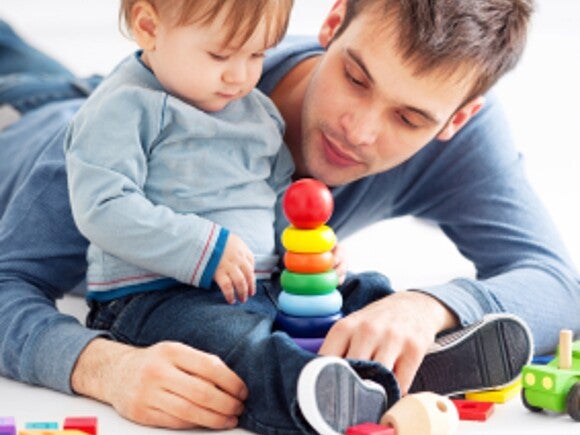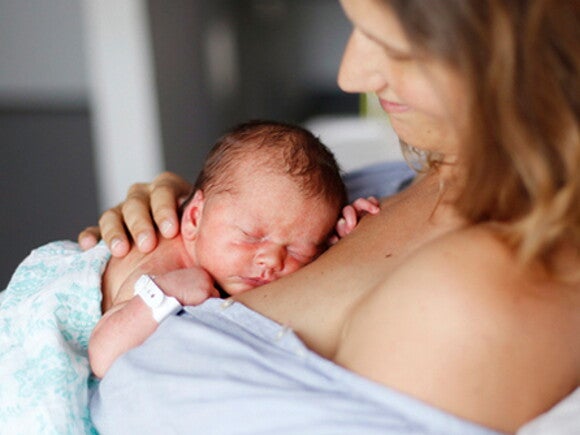Getting Your Baby to Sleep
As a rough guide, for the first four months, most babies sleep for 2-4 hours at a time, waking up for a feed and then usually going back to sleep. When your baby is about 3 months the sleep pattern changes to a pattern of 2-3 daytime sleeps for up to two hours each and may still wake at night at least once. From 6 months your baby will usually sleep for a period of six hours or more at night and will wake less. Most babies are also still having daytime naps which may last for 1-2 hours. Your baby needs about 16 hours sleep a day as a newborn and by 12 months old they require 12 hours at night and may have a nap during the day. Here's more on sleep patterns.
You can help your baby to sleep well during the first few weeks by mimicking the womb environment and re-settling them back to sleep after one sleep cycle rather than getting them up.
There may be issues preventing your baby from sleeping well during the early weeks, the challenge is to find out what it is. If you have real concerns that your baby’s health may be affecting their sleep patterns you should talk to your doctor. If there has been something hindering your baby’s sleep patterns, it could be several months after you resolve the issue before your baby sleeps for long stretches. Don’t panic as your baby’s sleep will eventually improve, even if you have to help them a little when they are older.
Short sleeps are referred to as power naps or cat naps. Newborns usually doze off constantly in short bursts throughout the day and night. As your baby gets older, and until about 12 months, your baby may sleep from 2-4.5 hours during the day. Daytime sleeping decreases with age and naps during this time can vary from 1-4 per day lasting anywhere between 30 minutes and 2 hours.
At around six months your baby will develop new abilities that may affect their sleep. They are more stimulated by their surroundings and may find it difficult to shut off and go to sleep. Establishing a pre sleep routine where your baby can wind down will help - encourage calmer quieter play and looking at books just before bed.
Dark induces calmer sleep so avoid light in the bedroom and make sure you pull the blinds or cover the stroller during day time sleeps. Creating a dark room can help reduce the stimulation.
Mimic the womb environment
Your newborn will need time and support to make a smooth transition from being warm and secure inside the womb to feeling comfortable and secure in the outside world. By mimicking the womb environment for a period of time your baby may find this transition a lot easier. When your baby is born prematurely the extra comfort and security of sleeping in a sling next to your body for extended periods of time may be just what your baby needs to help soothe and settle. The womb can be mimicked in the following ways:
- Warm and snug in the womb becomes swaddling and cuddling up close out of the womb
- Rhythmical movements from activity felt while inside the womb become rocking and swaying outside the womb
- Internal womb noises of the placenta, heartbeat and bowel sounds become humming, ‘white noise’, shhhing, singing, and your heart beat outside the womb
In the early days it is important to keep your baby secure and snug as they settle to sleep. Swaddling is an age-old practice of wrapping babies snugly in natural breathable material, blankets or similar cloth so that movement of the limbs is restricted. Your baby is born with a startle reflex which may cause them to wake during the lighter phases of sleep. The idea behind swaddling is that it prevents this reflex occurring allowing longer periods of sleep.
Swaddling
With what we currently know of Sudden Infant Death Syndrome (SIDS), it is considered safer for your baby to sleep on their back rather than on their tummy. Sleeping on the back can make some babies feel exposed and insecure, making it difficult for them to settle and sleep for long periods. During the first few months, an effective way to help your baby feel secure whilst sleeping on their back can be by wrapping them firmly (an ancient technique known as swaddling). Wrapping is a useful technique that can help you settle your baby and sleep them on their back. A comfortable swaddling technique places your baby’s hands in a natural position over the chest, preventing fidgeting and jerking as they settle to sleep. Swaddling also ensures the startle reflex does not jerk them awake between sleep cycles. This assists your baby to have a longer, more settled sleep. If your baby is over three months you may leave their arms free and wrap the lower body instead. This allows your baby to use their hands and fingers which can be a way of self soothing.
The following is a step by step guide of how to swaddle your baby:
- Place wrap on a flat surface with the longest edge folded over 10-15 cm
- Place your baby on the wrap with their shoulders lying level with the top of the wrap
- Bend arm up under the flap and bring the wrapped arm across the chest and tuck the wrap firmly under the back
- Do the same with the other arm
- Span out the bottom of the wrap and bring it up to the chest, spread it out and wrap firmly around and under the back
Swaddling your baby to aid settled sleep, is appropriate until about six months old but if your baby enjoys being wrapped and is sleeping well after this age, don’t worry, keep them wrapped for sleep time until they want out. You can help your baby sleep without the wrap by leaving one arm out then if they cope, take both arms out. Continue to wrap them from under their arms until you are ready to change them into a sleeping bag. Leaving an arm or two out allows your baby to suck on their fist or fingers to soothe themself to sleep.



















